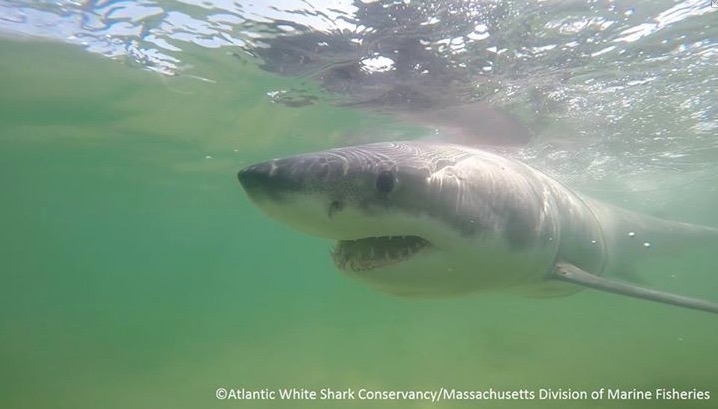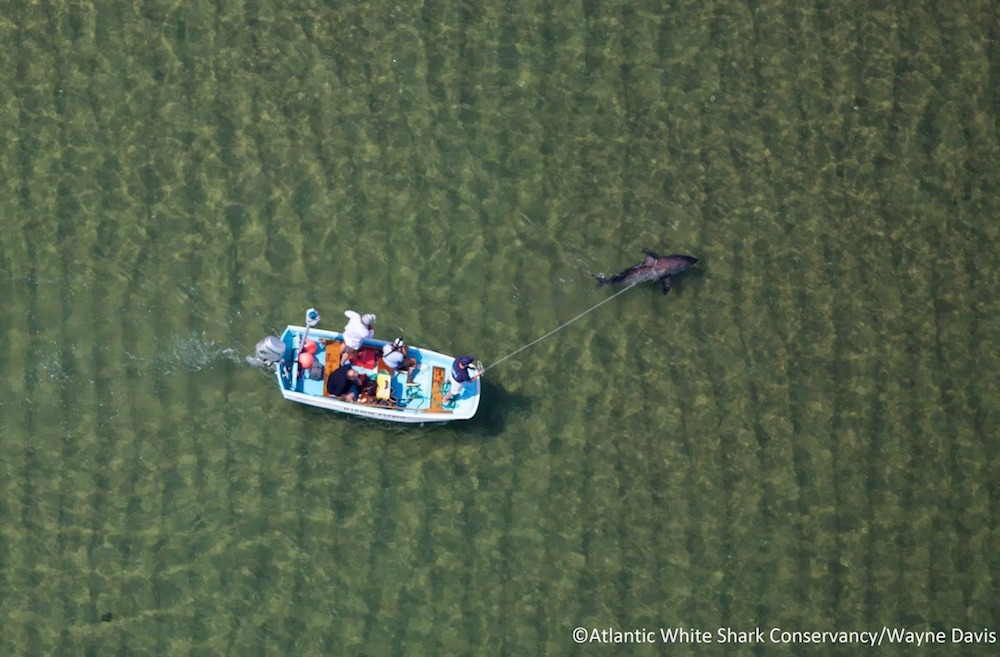Swim On! Rescued Great White Shark Likely Still Alive

A great white shark famously saved last month by Cape Cod beachgoers is likely still alive and swimming, said a shark expert.
The shark was rescued after it became stranded on a beach on July 13. Before it was released, experts pinned an acoustic tag to the shark's dorsal fin, which is on its back. A system of acoustic receivers — located about 3 miles (4.8 kilometers) south of where researchers released the shark — picked up the animal's unique signal within two weeks of the rescue, said Gregory Skomal, afisheries biologist with the Massachusetts Division of Marine Fisheries, who helped save the shark.
"It's very encouraging that the shark was alive," he told Live Science. "If I had to guess, if it survived for a couple days, it's going to survive [in the long term]." [Jaws Gallery: See Amazing Photos of Great White Sharks]
The young great white's tale is a miraculous one. The shark, a male juvenile, almost died after the retreating tide left it stranded on a Cape Cod beach in Massachusetts. Beachgoers saw the shark flopping around on the sand, and poured water over its gills to help it breathe and stay cool.
Videos taken of the rescue show the shark's underside turning red, likely because of capillaries bursting under the weight of its organs that were no longer supported by the buoyant water, experts said. Moreover, the heat and lack of oxygen likely strained the shark's body.
An organized effort involving the Chatham Harbormaster's office, the Atlantic White Shark Conservancy and state officials helped the shark survive. As soon as shark experts arrived on the scene, they tied a rope around the shark's tail and used a motorboat to drag the animal into the water.
Once waterborne, the shark got some new bling: an acoustic tag.
Get the world’s most fascinating discoveries delivered straight to your inbox.
"It's a little dart that goes underneath the skin, into the muscle at the base of the dorsal fin," Skomal said.
The tag emits a high-frequency sound that can't be heard by people or sharks, but is recognized by receivers stationed around Cape Cod, Skomal said. When a tagged shark swims within several hundred feet of a receiver, the device detects the unique ping and records the time and date, Skomal said.
Each tag lasts up to eight years, he added.
The researchers don't get the data in real time. Instead, they have to visit each receiver, pull it out of the water and download its data via Bluetooth, Skomal said.
The last time the researchers saw the young male shark, it was alertly swimming away from their motor boat off the cape. Great white sharks typically hang around the area because it's filled with grey seals, one of the predator's preferred foods. However, great whites also eat fish, and are known to feed on whale carcasses and sometimes even turtles, Skomal said.
Researchers will continue to monitor the rescued shark's movements, as well as 40 other tagged sharks with acoustic transmitters in the area, he said. But sharks often leave the area, leaving nary a clue about their whereabouts.
That's not always a bad thing, Skomal said.
"If we don't hear from it at all for the rest of the summer, it's even more encouraging because that means the shark swam away to a different area," he said. "They move around quite a bit."
Follow Laura Geggel on Twitter @LauraGeggel. Follow Live Science @livescience, Facebook & Google+. Original article on Live Science.

Laura is the managing editor at Live Science. She also runs the archaeology section and the Life's Little Mysteries series. Her work has appeared in The New York Times, Scholastic, Popular Science and Spectrum, a site on autism research. She has won multiple awards from the Society of Professional Journalists and the Washington Newspaper Publishers Association for her reporting at a weekly newspaper near Seattle. Laura holds a bachelor's degree in English literature and psychology from Washington University in St. Louis and a master's degree in science writing from NYU.



